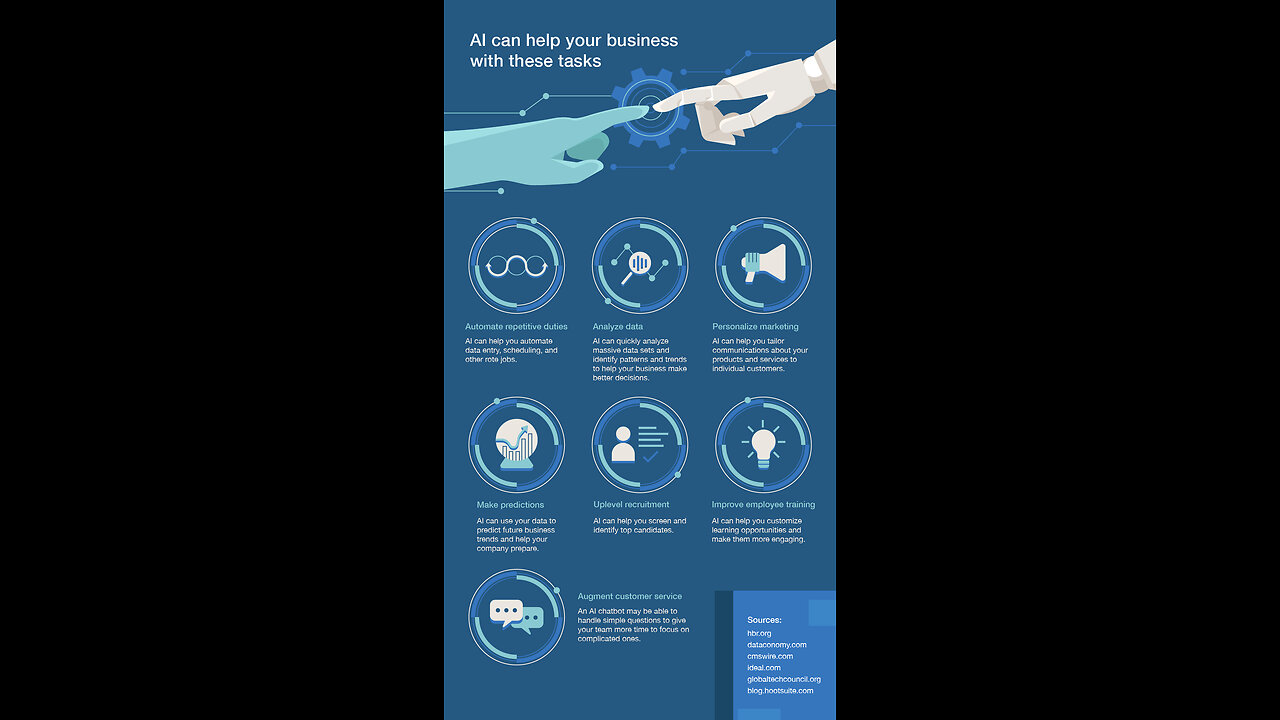Premium Only Content

How to Train Generative AI Using Your Company's Data - HBR.org Daily
🥇 Bonuses, Promotions, and the Best Online Casino Reviews you can trust: https://bit.ly/BigFunCasinoGame
How to Train Generative AI Using Your Company's Data - HBR.org Daily
Leveraging a company’s proprietary knowledge is critical to its ability to compete and innovate, especially in today’s volatile environment. Organizational innovation is fueled through effective and agile creation, management, application, recombination, and deployment of knowledge assets and know-how. However, knowledge within organizations is typically generated and captured across various sources and forms, including individual minds, processes, policies, reports, operational transactions, discussion boards, and online chats and meetings. As such, a company’s comprehensive knowledge is often unaccounted for and difficult to organize and deploy where needed in an effective or efficient way. Many companies are experimenting with ChatGPT and other large language or image models. They have generally found them to be astounding in terms of their ability to express complex ideas in articulate language. However, most users realize that these systems are primarily trained on internet-based information and can’t respond to prompts or questions regarding proprietary content or knowledge. Leveraging a company’s propriety knowledge is critical to its ability to compete and innovate, especially in today’s volatile environment. Organizational Innovation is fueled through effective and agile creation, management, application, recombination, and deployment of knowledge assets and know-how. However, knowledge within organizations is typically generated and captured across various sources and forms, including individual minds, processes, policies, reports, operational transactions, discussion boards, and online chats and meetings. As such, a company’s comprehensive knowledge is often unaccounted for and difficult to organize and deploy where needed in an effective or efficient way. Emerging technologies in the form of large language and image generative AI models offer new opportunities for knowledge management, thereby enhancing company performance, learning, and innovation capabilities. For example, in a study conducted in a Fortune 500 provider of business process software, a generative AI-based system for customer support led to increased productivity of customer support agents and improved retention, while leading to higher positive feedback on the part of customers. The system also expedited the learning and skill development of novice agents. Like that company, a growing number of organizations are attempting to leverage the language processing skills and general reasoning abilities of large language models (LLMs) to capture and provide broad internal (or customer) access to their own intellectual capital. They are using it for such purposes as informing their customer-facing employees on company policy and product/service recommendations, solving customer service problems, or capturing employees’ knowledge before they depart the organization. These objectives were also present during the heyday of the “knowledge management” movement in the 1990s and early 2000s, but most companies found the technology of the time inadequate for the task. Today, however, generative AI is rekindling the possibility of capturing and disseminating important knowledge throughout an organization and beyond its walls. As one manager using generative AI for this purpose put it, “I feel like a jetpack just came into my life.” Despite current advances, some of the same factors that made knowledge management difficult in the past are still present. The Technology for Generative AI-Based Knowledge Management The technology to incorporate an organization’s specific domain knowledge into an LLM is evolving rapidly. At the moment there are three primary approaches to incorporating proprietary content into a generative model. Training an LLM from Scratch One approach is to create and train one’s own domain-specific model from scratch. That’s not a common approach, since it requires a massive amount of high-quality data to train a large language model, and most companies simply don’t have it. It also requires access to considerable computing power and well-trained data science talent. One company that has employed this approach is Bloomberg, which recently announced that it had created BloombergGPT for finance-specific content and a natural-language interface with its data termina...
-
 LIVE
LIVE
Matt Kohrs
9 hours agoMore Pain Incoming?! || LIVE! Trading Futures & Options
587 watching -
 LIVE
LIVE
Wendy Bell Radio
4 hours agoDemocrats Need Fake Data To Cover Up Their Incompetence
6,194 watching -
 LIVE
LIVE
The Bubba Army
23 hours agoImmigrant Truck Driver.. Who's To Blame?! - Bubba the Love Sponge® Show | 8/20/25
12,634 watching -
 LIVE
LIVE
JuicyJohns
1 hour ago🟢#1 REBIRTH PLAYER 10.2+ KD🟢
78 watching -
 32:50
32:50
Uncommon Sense In Current Times
18 hours ago $0.20 earnedIs War Ever Just? Frank Turek Explains Just War Theory & Christian Ethics
10.4K4 -
 25:57
25:57
DeVory Darkins
1 day ago $16.98 earnedNewsom suffers HUMILIATING SETBACK after FATAL Accident as Trump leads HISTORIC meeting
40.6K140 -
 LIVE
LIVE
FyrBorne
12 hours ago🔴Warzone M&K Sniping: First Impressions of Black Ops 7 Reveal
194 watching -
 8:16
8:16
MattMorseTV
18 hours ago $9.24 earnedTrump’s name just got CLEARED.
82.5K84 -
 2:01:55
2:01:55
MG Show
22 hours agoPresident Trump Multilateral Meeting with European Leaders; Trump Outlines Putin Zelenskyy Meeting
32.4K27 -
 LIVE
LIVE
DoldrumDan
3 hours agoCHALLENGE RUNNER BOUT DONE WITH ELDEN RING NIGHTREIGN STORY MODE HUGE GAMING
70 watching